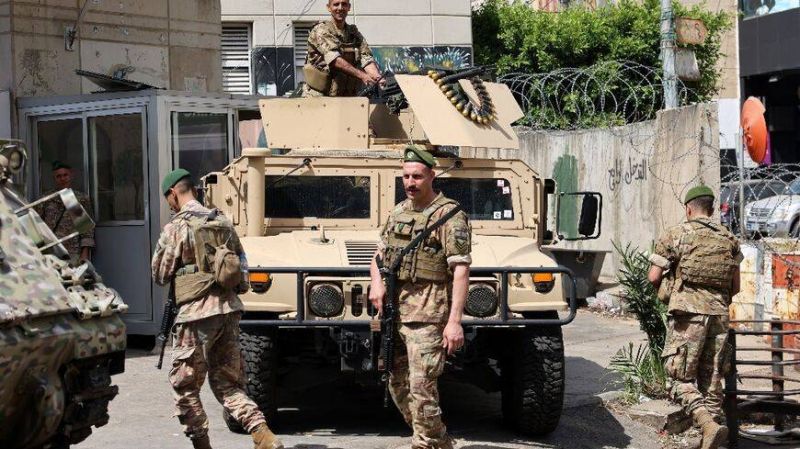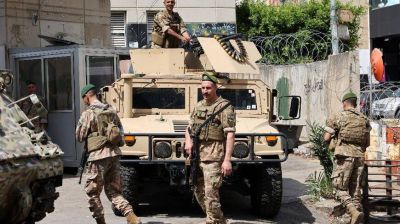
Lebanese Army soldiers (Credit: AFP/File photo)
One month ago, a Lebanese couple was passing through an army checkpoint when they heard gunfire.
Frightened, they put their car in reverse and attempted to flee from the scene, but army soldiers mistook them for suspects. The soldiers fired at the car, severely injuring the driver.
Incidents like this beg the question: When are Lebanese Army soldiers and security forces legally empowered to fire their weapons at suspects?
Contacted by L’Orient Today, spokespeople for both the Lebanese Army and the ISF said that they abide by the law of “gradual violence.”
The Lebanese Army is responsible for national defense and internal security. Soldiers are often assigned to missions and raids that could escalate to violence.
“In case of unarmed civilians, you use every method possible, like teargas and water, before escalating to shooting in the air,” a Lebanese Army source said.
The source explained that army soldiers can return fire if shot at, following the principles of self-defense.
“In [the event that] someone shot at a soldier, it is a risk to their life so they have the right to shoot back.”
The Internal Security Forces code of conduct explicitly states: “Police members shall avoid any unnecessary violence in the exercise of their coercive powers, and the use of force should be proportionate and commensurate with the circumstances if other means failed to accomplish the mission.”
A security source explained to L’Orient Today that, when dealing with protestors, security forces should first ask people to get back or leave the area.
“After such warnings, we start using water or teargas,” the source explained. “We only fire rubber bullets in cases [where] there are high injuries among security forces or if the protestors violated the security fence.”
The source added that security forces may fire their weapons at protestors in the event that protestors “breach public properties that should be protected by armed forces.”
Other than protests, the source explained that security forces also have the right to discharge their firearms at fugitives who are trying to escape.
“We wouldn’t shoot at them to kill them but to try to stop them. And sometimes they get injured along the way.”
If someone tries to escape a checkpoint, the source explained that security forces are unlikely to open fire on the vehicle even though they have the right to do so.
“It is a very delicate thing, we only shoot at the car after verbal and visual warnings, like shouting that we are going to shoot if they don’t stop or flashing lights at night, but even then we don’t always use this right because people’s lives are on the line.”
Asked about the moral justification of shooting at someone if they tried to escape a checkpoint, the security source said that there is the “aura of the state that should be maintained and, that to protect the rule of law, violence sometimes has to be used.”
Farouq al-Maghribeh, a lawyer familiar with security violence, told L’Orient Today that the law only vindicates the use of firearms directed at a citizen when “absolute necessity and self-defense. It should be the last resort.”
However, he said, security forces don’t always abide by these rules.
A history of violence
Mghribieh cited the infamous Aug. 8, 2020, protest, a few days after Aug. 4 port explosion, when security forces used excessive power against protestors.
“During Aug. 8, the action and reaction were not proportional. There were peaceful protesters and the security forces fired teargas chaotically and at a long distance at protestors who did not pose any threat against them.”
In its report about the protest, Human Rights Watch said security forces used lethal force against mostly peaceful protesters, causing hundreds of injuries.
“Security forces fired live ammunition, metal pellets, and kinetic impact projectiles such as rubber balls, including at health workers, and police deployed excessive quantities of tear gas, including at first aid stations,” according to the HRW report.
“Several teargas cartridges were fired directly at protesters, striking some in the head and neck. Security forces also threw stones at protesters and beat them,” the report continued. “The forces involved included the Parliament Police, the Internal Security Forces (ISF), the Lebanese Armed Forces (LAF), and unidentified forces in civilian clothing.”
In a statement, the ISF denied that their members used live ammunition, rubber bullets, or metal pellets during the Aug. 8 protest in downtown Beirut, but said that the Parliament Security Force, comprising Parliament Police and an army company, did use these weapons.
The army did not respond to Human Rights Watch's letter, and the Parliament Police declined to comment.
The ISF announced that one of its members died on Aug. 8 while trying to save people trapped at the Le Grey Hotel, and added that 70 ISF members were injured. The army stated that 105 of its soldiers were injured, including two in critical condition.
No legal action was taken against security forces accused of excessive use of force.
That’s not always the case.
On April 27, 2020, the Lebanese Army killed a protester in Tripoli’s Nour Square.
Demonstrators had gathered to protest the rapidly deteriorating living conditions during Lebanon’s economic crisis amid COVID-19.
A Lebanese Army source told L’Orient Today that the soldier who killed the protester was jailed and prosecuted at the military court. He said the army has taken measures against its members during similar incidents.
Security sources were granted anonymity because they are not authorized to speak to the press.
